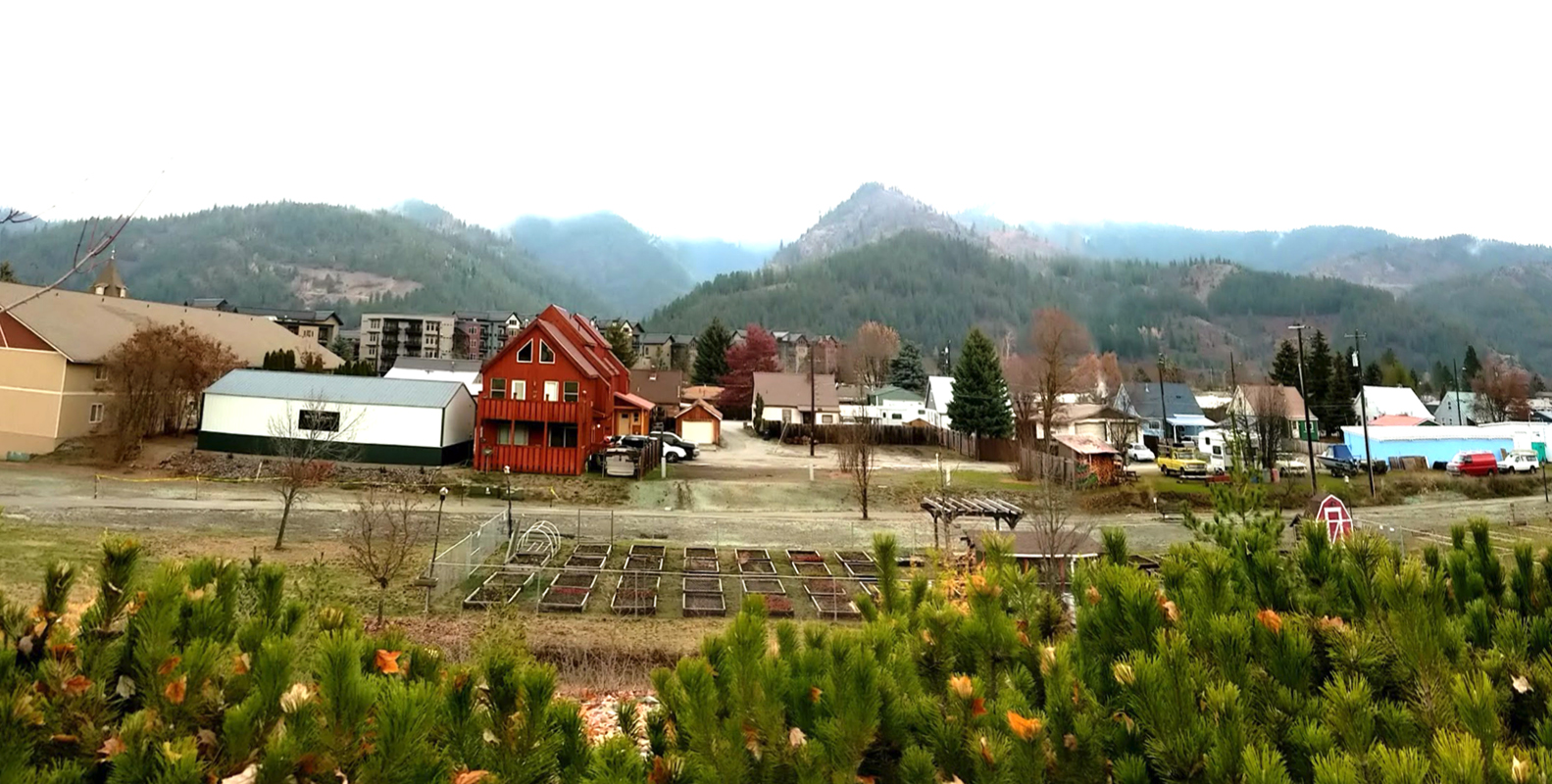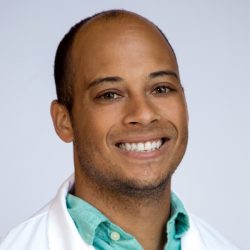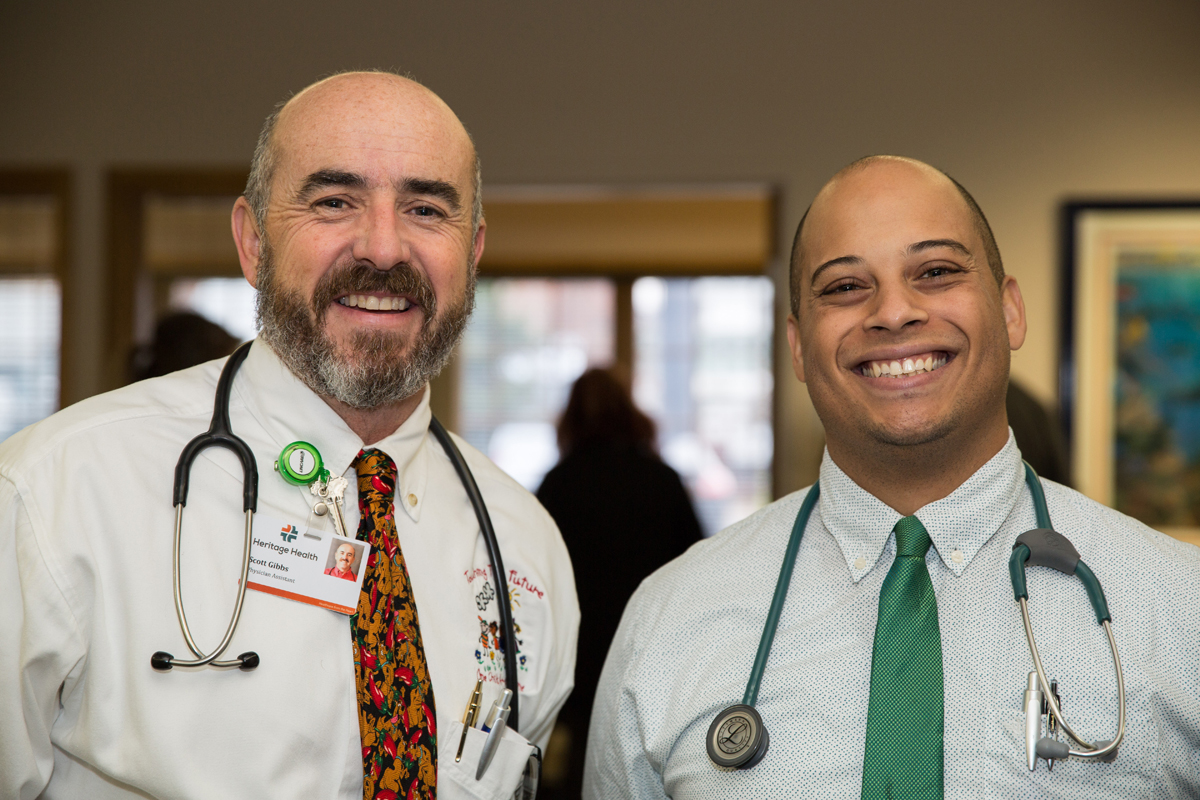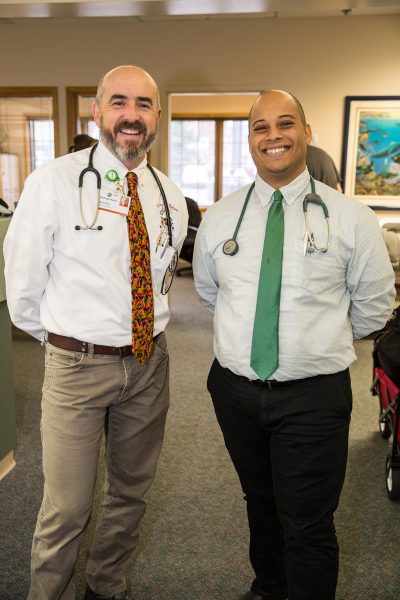David Hanson is in the midst of his 4-month family medicine preceptorship near the start of his clinical year with the MEDEX Northwest physician assistant program, and he’s excited.
“I’ve been amazingly fortunate,” he says. “I don’t think I could have found a better preceptor. Yeah, it’s been a fun rotation so far.”
David is referring to Scott Gibbs, PA-C, himself a graduate of MEDEX Seattle Class 28 from 1996. Both are seeing patients at Heritage Health Kellogg in Kellogg, ID. For David, he’s moved out of the MEDEX Spokane classroom and into the clinical environment where he’ll hone his skills under Scott’s guidance.
The town of Kellogg sits in the Idaho panhandle and was founded by a prospector named Noah Kellogg. The town once represented big industry in this region of Idaho. After nearly a century of mining activity, the bigger mines and accompanying smelter closed in 1981, leaving thousands out of work. As of the 2010 census, the population dropped from its all-time high of around 6,000 to its current numbers, or just above 2,000.
“Presidents would come here to campaign because the population was large enough to affect national votes,” explains David. “Today, they’re pulling ore out of only one mine, so that kind of industry, money, and influence went away.”

A view of Kellogg, ID in November. Since the mines have closed the town has focused on accommodations for winter skiers.
Heritage Health Kellogg sees mostly Medicare and Medicaid patients. As an FQHC, a Federally Qualified Health Center, it is one of the few clinics in the area authorized to serve that patient population. “We also work with patients on a sliding scale if they happen to be cash pay only.”
Working with this community can mean dealing with “diabetes, hypertension—lots of chronic disease states that need to be managed.”
For David these folks that are the salt of the earth. “They’re just hard-working individuals that want to get their healthcare under control. And I’ve seen a lot of positivity in the face of many challenging situations that I wouldn’t handle as well. They’re a really great community, very close-knit, where everyone knows everyone.”
Through it all, preceptor Scott Gibbs, PA-C, has guided David’s PA education outside the MEDEX Spokane Class 21 classroom.
David did his Care Week—a weeklong rotation during the MEDEX students’ didactic year—with Scott. On that first day, the pair met for coffee before seeing patients. “I knew it was going to be a good fit,” says David.
The clear benefit of working under a preceptor with 20 years’ experience is not lost on David.
“Scott is seeing patients every day, not to mention he’s like an encyclopedia,” says David. “He knows everything—anatomy, and the mechanism for drugs. He practices great medicine. I’m hoping that this kind of facility comes with time in the field because it’s a bit daunting.”
During his four months at Heritage Health Kellogg, Scott gave David plenty of time to ease into the patient experience. “He’s very perceptive at figuring out when you’re ready to face certain things,” David reports.
 Sometimes David will attempt to stump Scott. It hasn’t worked yet. But when David comes to Scott with an inconclusive diagnosis, Scott will confer and suggest ordering tests.
Sometimes David will attempt to stump Scott. It hasn’t worked yet. But when David comes to Scott with an inconclusive diagnosis, Scott will confer and suggest ordering tests.
“He always asks me, ‘Are they going to die?’ Usually, the answer is no. So Scott will say, ‘Okay then, you don’t need to have the answer today. But you’ll need a plan to figure out the answer so long as they’re not going to die’.”
Along the way, Scott has taught David that when practicing rural family medicine, he’s likely to see people that may not be compliant with their diabetes, or that are still smoking even after being diagnosed with COPD.
“These patients may not do what you recommend for their health, but they keep returning to the clinic,” David says. “Scott taught me that these patients may not be sure how they’re going to feed themselves tomorrow. They can’t set aside the money to buy medicine because they’re challenged to take care of their family basic needs, much less whatever medication we’re prescribing for them. Or we hear that they don’t have time to make it to the gym because they’re working three days on at the mine and also working a second job to support their family. They tell us, ‘I’d love to get my hypertension under control, but I also need to feed my family’.”
David Hanson grew up in Missoula, MT, and was adopted by his family around the age of one.
“My mom was a nurse,” he tells us. “She just retired two years ago. So, I grew up around medicine and had insight into the field at a pretty young age.”
Going through school in Missoula, David discovered that he enjoyed science. He met his now wife, Shelby, when they were both high school sophomores. They dated for five years. Eventually, David attended the University of Montana while Shelby went on to a technical college in Missoula.
During his undergraduate years, David was focused on a future application to medical or pharmacy school, the two options available to him at UM. Marriage came to David and Shelby in their sophomore year. A first child was soon to follow.
“I realized that I needed to provide for my family, so I became a medical technologist,” he says. The job was to analyze and test body fluids and tissues while working the night shift in a Missoula lab.
“Things were going great, but I’d never get to see my kids.” By that time there were three children.
At the lab, David became friends with a physician assistant and shadowed him for a week. It was then that David had a realization.
“Oh my gosh. I am missing something that I love.”
That something was all about talking to people and being active in a patient’s healthcare. As a medical tech, he was restricted to running their labs and looking in the microscope.
“I mean, it’s great, it’s fun,” David says. “It gives you a pathophysiology background. But I wanted to talk to people and be more active in their healthcare.” PA school was looking like an eventuality.
During this time David and his wife found out they were pregnant with their fourth child. A miscarriage ensued, followed by a period of grieving. But eventually, David applied to MEDEX Northwest for admission to the incoming Spokane class of 2017. MEDEX was the only school he applied to.
“I was dead set on MEDEX,” he tells us. “I read the mission statement and loved that they focused on primary care and rural medicine because that’s what I wanted to do.”
To avoid the night shift, David had already moved his family from Missoula to Coeur D’Alene, ID. Now, with a 40-minute proximity to Spokane, he wouldn’t have to move them again in order to pursue another avenue of medicine.
At the MEDEX interview process, the sessions are set up to be team-based with several applicants meeting together with faculty.
“The whole application process really does seem to pull apart people from different medical and social backgrounds”, he says. “We each arrived with varying degrees of experience in different areas. And so our class has people that have done everything from physical therapy, nursing, labs, scribes, and techs. They’re all awesome. Spokane Class 21 has done what I think is a wonderful job of working together. I haven’t noticed any problems, any strife. I’ve never had an issue with one of my classmates. Sure, we disagree at times, but things are handled diplomatically.”
Apart from his classmates, does David miss the didactic year in the classroom?
“Well, I’ll refer to the classic description used to illustrate the didactic year: it’s like drinking from a firehose. At times the information is coming at you so fast that it’s hard to grasp any one concept before the next one’s right there to hit you in the face.”
In short, he does not miss the didactic year. Yes, it was hard work, and it required a lot of late nights studying.
“But if you’re going to do something at this level, you need to put in the work, you need to sit in a seat. It’s long days and when winter hits it’s hard not seeing the sunshine. The reward is you know that at the end you’re going to get out and see patients. You know that you’re doing this so that you can achieve a goal.”
During the clinical year out in the field, all the classroom concepts take root.
“You realize that you’ve retained information,” David says.
With the repeat exposure of patients, he recognizes what a particular disease state looks like along with the comorbidities that accompany it.
“You nail down diabetes management, or you nail hypertension. And then you get something unusual and it’s really fun to walk up to your preceptor and say, ‘Oh my gosh, I’ve got a Zenker’s diverticulum. I’m pretty sure that’s what it is. It’s classic.’ And then you have that conversation about the treatment plan.”
The flipside in the clinical year is that not everything presents with classic symptoms.
“Diseases don’t read textbooks,” David says. “If they have an infection, patients don’t read textbooks. The bugs don’t read textbooks.”
In the absence of any classic disease path, David finds it intriguing to work with the patient and tease out exactly what’s going on.
Scheduled to graduate with his class in August of 2019, David has his sights set on working in a family medicine practice once certified as a PA.
“I’ve loved working here in a rural clinic,” he says. “I can walk into one room and do a health check on a two-year-old and in the next room I’ve got a 93-year-old with COPD. And it’s the variety of patients that I find really exciting.”
At the time of our visit with David at Heritage Health Kellogg, he had six one-month specialty rotations ahead of him, including an Emergency Medicine rotation at Kootenai Hospital in March.
“I think I’m a little afraid of emergency medicine,” he confides. “I may love it, but I don’t need that much excitement in my life. I get enough adrenaline driving from Coeur D’Alene to the Kellogg clinic every day.”





























